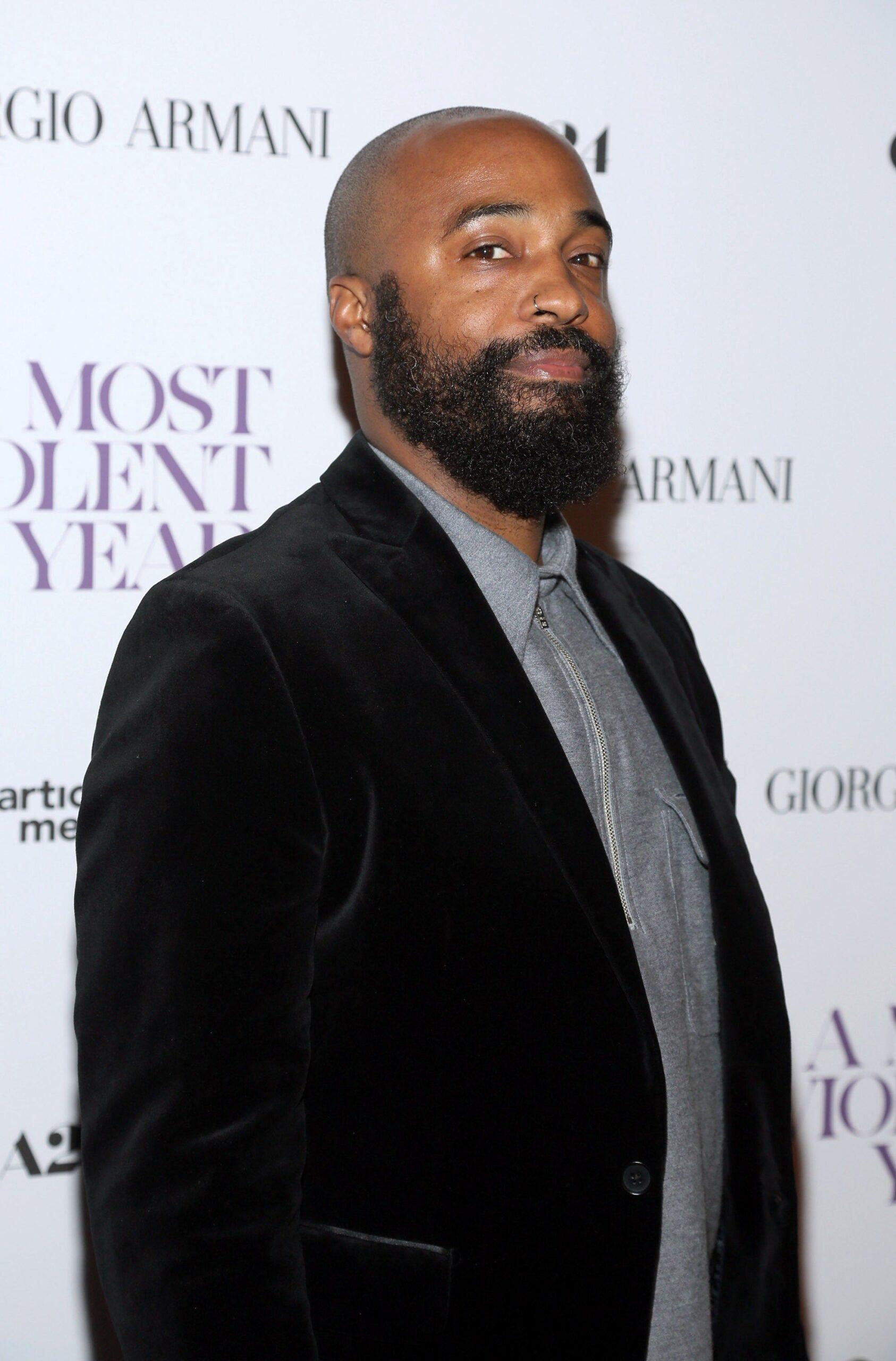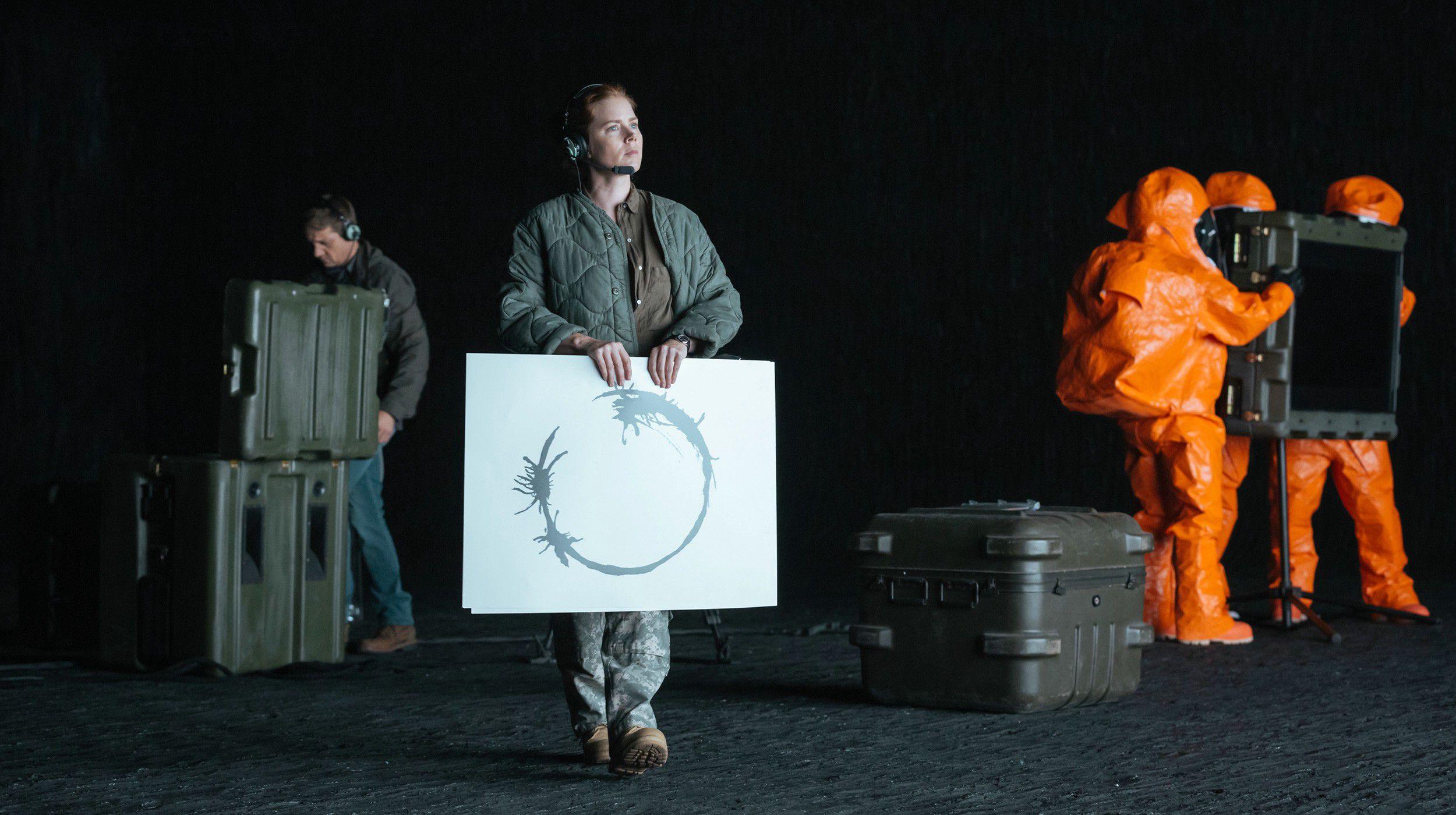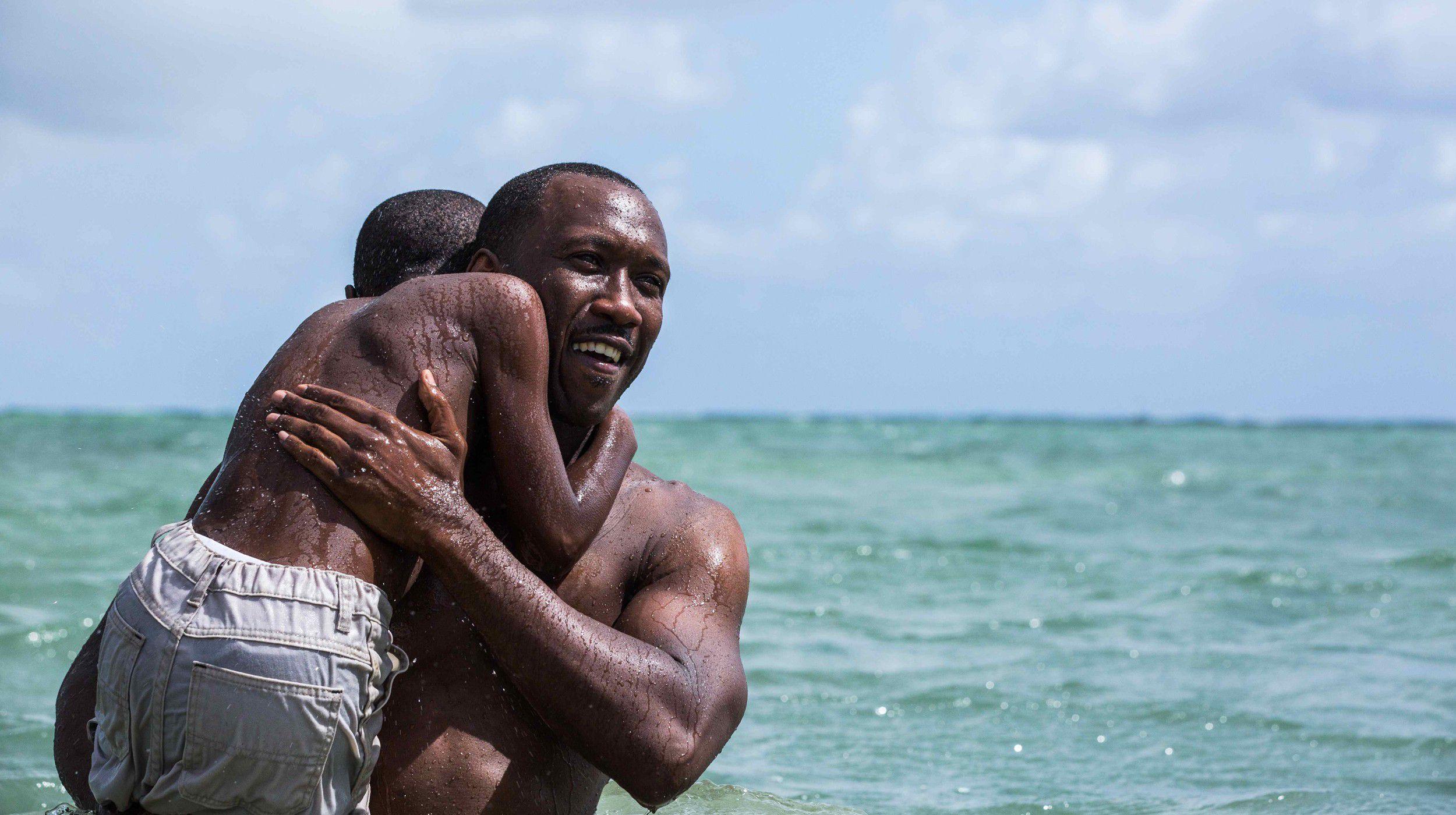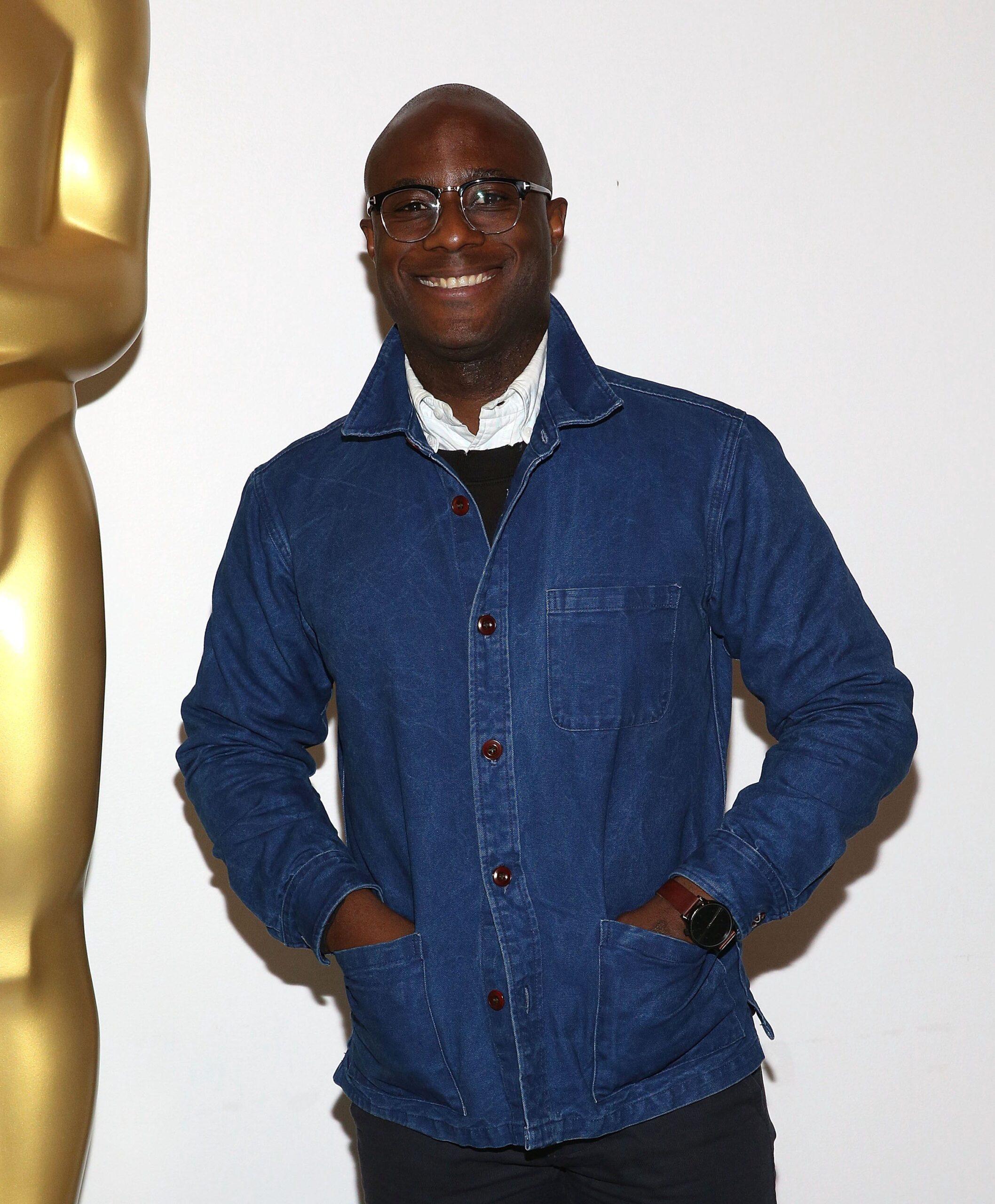In the new movie Arrival, a spacecraft that resembles a giant halved Fabergé egg descends upon a swath of empty farmland in Montana. For days, this pewter-hued unidentified flying object simply floats, undisturbed, a few dozen feet above the surface of the planet, like a ghost of science future. The image is breathtaking and wrong-seeming, like seeing a waterfall at the dead end of a suburban street. It is a picture you can see only in the movies. For the filmmakers, it’s something more than that.
"For me, [Arrival] was the chance of a lifetime," says the movie’s cinematographer, Bradford Young. "It gave me another interpretation for life."
Collaborating with the director Denis Villeneuve, Young helped create the film’s images, interpreting the work of the photographers Martina Hoogland Ivanow and Todd Hido to render something uncommon. "Their work really spoke to what the film wanted to be," Young says, "which was the spectacular nature of mundane life."
That much is clear. Starring Amy Adams and Jeremy Renner as a linguist and a scientist, respectively, tasked with understanding the aliens, Arrival is the kind of movie we are told they do not make anymore. It’s a big-budget original story led by movie stars, with no designs on a franchise. There’s a filmmaker with a vision at the helm. It is both expansive and contained, artful and perceptible. It’s about family and the power of loss. It’s for adults.
This is more rare than it should be. There is a canard that has emerged in the cultural conversation in recent years — "Movies are dead." It intermittently emerges on social media, typically around the time an invigorating new TV show drops on Netflix or the Emmys wrap up or a prospective blockbuster lands with a thud. Arrival and a handful of other new movies releasing in the last quarter of the year offer a rebuke to this increasingly conventional wisdom: Movies aren’t just for superheroes and Minions. But no matter their quality, they reveal a lot about how compartmentalized and marginalized movies have become in the consciousness.

For Young, 39, and Villeneuve, 49, Arrival represents a step up, from the realm of well-regarded, successful midbudget movies — Selma and A Most Violent Year for Young; Prisoners and Sicario for Villeneuve — to the kind of sweeping, visual-effects-laden project that typifies "making it" in Hollywood in 2016. As a reward for the accomplishment of their new and still unreleased movie, each man has been presented the chance to update some fertile intellectual property — Young will shoot the young Han Solo Star Wars prequel for directors Phil Lord and Chris Miller next year, while Villeneuve is currently filming Blade Runner 2049. It’s a bittersweet way to understand accomplishment in the movie industry: After decades of work and accolades — Villeneuve was nominated for a Best Foreign Language Film Oscar for his 2010 drama Incendies — both men are left to riffle through Harrison Ford’s backpages.
But first comes Arrival, a summation for both artists, a philosophical Easter egg spring-loaded into a genre catapult.
"It’s truthfulness, man," Young says of what excites him about the movie. "You’re distracted by guns, explosions, visual effects, but that’s fine. We’ve accepted that as our reality as an audience and we’ve learned to work within those things, so they don’t affect our life. I think, really, what people want is just real human drama, real human story."

"I haven’t seen Arrival yet," the journalist and film historian Mark Harris says when I call him to talk about movies, "but is there a slot for that movie once a year, the way there was a slot for The Martian and Interstellar — sort of genre but in a high-end, serious-director way?"
In one fell swoop, Harris — perhaps the most incisive observer of Hollywood decision-making (and a former colleague of mine at Grantland) — pinpointed a strategic marketing plan that has taken hold. Christopher Nolan’s Interstellar was released in early November 2014 and eventually grossed $675 million worldwide. Ridley Scott’s The Martian opened in October last year and pulled in $630 million. Interstellar was codistributed by Paramount; Arrival is as well. The deduction is clear: Even the most artful fantasia is a line on a ledger — movies must succeed to be made. Numbers count the most.
"The problem in the entertainment business," the longtime producer Chris Moore says, "is always how to get your money back, because it’s a huge expense upfront."
Arrival has been placed in an optimal position on the calendar, when audiences have been trained to expect a certain kind of high-toned moviegoing experience. Across decades of trial and error, a pattern has emerged. The late winter is marked by savvily marketed genre fare (Deadpool; Ride Along 2) and big-budget studio hopefuls (Pride and Prejudice and Zombies) that went haywire somewhere along the way. The summer season has been elongated into a seven-month slog that began this year with the deathless Batman v Superman: Dawn of Justice in March and ended right around when Jack Reacher: Never Go Back flopped last month. The late fall and holiday season is for everything else, which some see as demarcated for quality work.
"I think you can forget how many good movies come out in a given year if they’re just cramming together," says Manohla Dargis, the longtime New York Times film critic, "and you’re just like, ‘Wait, wait, I have to see Moonlight. Oh, wait, and then I have to see The Handmaiden, and oh, and there’s Arrival, and oh and there’s Doctor Strange, which is actually good.’ Recently there’s been this kind of traffic jam. I don’t think that the way that the seasons are set up now is actually helpful in terms of encouraging consistent movie love."
Dargis sees more movies per year — some 300 — than most average consumers see in 10, but that which makes her exceptional also makes her more qualified to explain the state of the art than nearly anyone. When I mention "Movies Are Dead" to Dargis, she flatly responds, "I don’t believe in that." But she acknowledges there are sincere challenges facing the industry — "not a growth industry, but a mature industry" she calls it — and the artists who occupy it. It’s a strategic imbalance that is confusing people looking for something interesting to see.
"[When] the summer comes up and you’re like, ‘Well, here’s this week’s piece-of-shit movie that I have no reason to see or want to see — why would I see that?’" Dargis says. "And so, if you just have too many months where it’s just this barren time … it’s not helpful in encouraging that kind of old relationship that people had with the movies."


That relationship is in jeopardy. According to Box Office Mojo, 704 movies — the most ever — were released last year that grossed at least some money in theaters. (The lowest, Confession of a Child of the Century, drew $74 in limited release.) The American theatrical movie industry raked in an extraordinary $11 billion at the box office, more than any other year. But that data point is misleading because it did so with the third-fewest tickets sold in the past 20 years, against the highest average ticket price in history ($8.43) and the highest number of releases. This includes the accounting for Star Wars: The Force Awakens, which, with a lifetime gross of $937 million, is the biggest domestic release in movie history by more than $175 million.
The diagnosis is simple: More product, more competition, higher cost, lower engagement. Movies are not the financial services business — commingling art with commerce is not an exact science. But the conglomerations that produce the most visible movies demand order, and thrive on expectations. Last year was an outlier in many ways, but there are a few indisputable facts: (1) There have never been more movies to see. (2) With the onslaught of 3-D and luxury theater experiences, it’s never been more expensive to see them. (3) Most theatrical releases have almost no chance to succeed.
"The moviegoing experience for people who consider themselves moviegoers of any generation is still primarily, ‘I wonder what’s opening on Friday? I wonder what’s playing at the theater nearest me?’" Harris says. "Obviously in the last 20 or 30 years, a ton has changed even in that regard. You can reserve seats in a lot of places. Nobody has to wait online for three hours anymore. The movie that you want to see is more likely than it was 20 or 25 years ago to be playing on so many screens that you can see it on the first weekend without putting yourself through some huge inconvenience. But it’s still basically, ‘What’s playing, and when can I see it? And where can I see it?’"
Harris is the author of Five Came Back: A Story of Hollywood and the Second World War and Pictures at a Revolution: Five Movies and the Birth of the New Hollywood. Quentin Tarantino recently called him "maybe the best film writer ever." He comes to his analysis by mixing reporting, research, critical acumen, and an instinctual knack for the roiling nature of the business. When he writes, he raises hackles.
"We don’t have any data on video on demand or iTunes sales," Harris says. "This is completely anecdotal, obviously, but when I talk to my relatives in suburban Louisiana, or in upstate New York, or outside of Los Angeles, when they look at their local theater they say, ‘There’s nothing playing. Everything’s a cartoon or a comic book movie or a sequel.’ For moviegoers over 40, there absolutely is like a palpable change in the pleasure they take from going and a growing feeling that there really isn’t anything for them anymore."
There are, of course, other reasons for the doomsaying that accompanies any global conversation about the industry. More than anything, the most persistent threat to movies as the colossus of American creativity is invariably TV. Not just the persistent growth and dispersal of television, but there is something about the rising quality of the medium that almost threatens movie lovers.
Few have been as dissolute about the state of movies as Bret Easton Ellis. The author and screenwriter hosts the Bret Easton Ellis Podcast, a semiweekly interview show that often opens with a dismayed, almost disgusted spoken essay about the wretched movie environment. Ellis is sweeping in his opinions, dismissing darlings with aplomb, slaughtering sacred cows with a heavy blade, and even proffering a hot take or three. Ellis has transitioned from enfant terrible to excoriator elite. But you’d be hard-pressed to say he doesn’t love movies. When we speak, he is almost wearied by the idea of repeating himself on the unraveling of movies’ power. Still, I can hear a twinge of the Sherman Oaks movie nerd who became enraptured by adolescent screenings of Carrie and The Texas Chain Saw Massacre.
"Those conversations between people who grew up with movies and who kept up with a certain kind of movie were happening less and less," Ellis says. "And television began to dominate the conversation. I was a believer that this really wasn’t going to happen, this sea change from our interests in movies to a total interest in television. I really thought that for a long time it wasn’t going to happen, just because of the simple economics of TV and reality, which is there’s not the money or the time to really take visual care of the show.
"Look at The Night Of, which was better than any American movie I’ve seen this year, and even Atlanta on FX, [which] has a cinematic look to it and takes its cues from cinema and not from TV. And now I’m OK with it. I mean, sure, I’m disappointed that an American art form is in its dying days, but because of a lot of reasons. Part of it is that the democratization of the arts — especially in movies — has kind of destroyed the idea of the well-crafted, expensive, intelligent movie made for adults."
But TV has claimed primacy in the war for attention for reasons other than quality of execution. There is a thrusting imperative to stay on top of TV all the time — to read the recaps, to tweet along, to engorge the punditocracy — that movies have struggled to counter.
"The reason you want to watch The Walking Dead right away is because in a week there’s going to be another one," Harris says. "If you don’t, you’re going to fall behind. Yes, you might also have it spoiled for you on social media if you don’t want to watch right away, but the weekliness of a TV show is perfect for engagement.
"It’s why, for all of its success, the buzziest Netflix shows have been treated in some ways like movies. Stranger Things was a huge success for Netflix this summer, but it was a huge success in the mode of a movie that suddenly took off. Nobody was saying, ‘Oh my God, I can’t wait to see the next episode of Stranger Things,’ because nobody had to wait to see the next episode of Stranger Things."
Ellis is the kind of cultural critic who says that movies like Arrival don’t happen anymore. That’s not completely true, of course. Studios have never been more overleveraged by superhero tentpoles, properties based on wildly popular series like Harry Potter, and animated features. That triumvirate represents the bulk of the successful movies released in 2016. But there are exceptions. Harris points to one curious case.
"In the ’90s or late ’90s or early aughts, a movie like Money Monster would’ve been a much bigger deal," he says. "And it’s not just because George Clooney and Julia Roberts are older now and therefore less impactful, it’s because in the late ’90s, if you put two people like George Clooney and Julia Roberts in a movie, that would’ve been considered to be the marketing. That [was] enough. And now it’s not. That gets you $40 million or $50 million. Money Monster is the movie whose presence suddenly made us realize that there is a whole kind of movie that studios don’t make anymore. It suddenly made us realize that the ’90s were an era and it’s over."
Of course, Money Monster stars two people that young moviegoers may not have a relationship with whatsoever. Julia Roberts is 49 years old; George Clooney is 55. Harris was an editor at Entertainment Weekly during that ’90s era he describes, when the magazine amplified the star market and capitalized on the final days of a kind of mainstream movie enthusiasm that would seem impossible now. Here’s a pertinent example: Twenty years ago this month, EW’s maximal holiday movie preview was toplined by the George Clooney–Michelle Pfeiffer romantic comedy One Fine Day. This year’s fall movie preview cover? Fantastic Beasts and Where to Find Them star Eddie Redmayne. Neither film aspires to high art, but one existed in a self-contained world — a one-day affair — and the other is merely a tendril in a vast corporate octopus that includes book publishing, theme parks, merchandising, and a decades-long film franchise. This week it was announced that Johnny Depp, the swashbuckling pirate of modern IP, had signed on for the forthcoming Fantastic Beasts sequel. A fitting match.
Quality has not necessarily ever been the hallmark of Hollywood studio films, but the all-or-nothing proposition of many tentpole movies prizes some things above others. Timing and tactics trump art in nearly every case.
"I was having dinner with a couple of executives who know other executives who are working on the [forthcoming] Batman movie, The Batman," Ellis tells me. "And they were just telling me that there are serious problems with the script. And that the executives I was having dinner with were complaining about people who work on the Batman movie. And they just said they went to the studio and they said, ‘Look, the script is … Here’s 30 things that are wrong with it that we can fix.’ And [the executives] said, ‘We don’t care. We don’t really care. The amount of money we’re going to make globally, I mean 70 percent of our audience is not going to be seeing this in English. And it doesn’t really matter, these things that you’re bringing up about the flaws of the script.’ So I do think global concerns play a big part in how movies, and what movies, are being made, obviously."
In lieu of a sophisticated superhero movie, Ellis laments the lack of innovative filmmakers working the limits of the studio dollar, pushing for bigger and more personal visions.
"There will not be another Coppola," Ellis says. "There will not be another Spielberg. There will not be another Scorsese. There will not be another Altman. Because the melding of that kind of artistic mind with a cultural experience, which was going to the movies and watching a large-scale film on a giant screen that’s not IMAX that isn’t a Marvel movie, is over. It’s shifted to television, and that basically now what we’re going to get on television, is someone trying to recapture the glory of 20th-century cinema on TV."
For Dargis, cries for the past are both reductive and impossible to satisfy. The systems that existed have changed irrevocably, she says, but there are still landmark achievements.
"The major thing that we have to remember is that the major American movie studios are not the movies. They are apart," she says. "The American movie industry has absolutely changed and it’s very different and we can regret some of those changes and we can also say, ‘It is what it is and let’s move on,’ [but] let’s actually look at the work versus anguishing that it’s not 1957. I personally don’t want to go back to 1957.
"The Godfather is one of my favorite movies, absolutely, but There Will Be Blood is also a masterpiece and one of the greatest movies of the last 50 years, and that was made by an independent company and released by a studio — so masterpieces still get made. It’s just different."


What control does the independent distributor have in the sifting of American movies? Because while box office grows and cultural footprint erodes, movies tangle not just with TV’s undeniable power (and the distractions of music, video games, social media, et al.), but the shifting stratagem of the movie business.
"We get so focused on the question ‘Are movies dead?’ that it’s easier to forget there’s another question," Harris says, "the answer to which will be as determinative to the future of movies as that one, which is: Do you love movies? The ways in which the answers to that will change — and because the definition of movies changes — I don’t think you’re going to get the same answer from a 25-year-old and a 45-year-old."
The answers to those questions come in different forms. In the past five years, a handful of new benefactors have appeared. For two decades, the major studios supported small imprints — outfits like Miramax, Paramount Vantage, Sony Pictures Classics — that favored serious films by serious filmmakers, often purchased at festivals or developed in-house with a specific and sophisticated audience in mind. Sometimes, like, say, with Pulp Fiction in 1994, one of those movies would become a phenomenon. More often than not, they would become Flirting With Disaster — a single in a home run derby. Good for the filmmaker, fine for the imprint.
Now, many of these corporate arthouse welfare programs are gone or neutered. From the ashes of the major studio boutique houses comes independent producers and distributors like Annapurna Pictures, funded by the wealthy scion Megan Ellison, and A24, launched by Daniel Katz, David Fenkel, and John Hodges — a financial services executive and two film development veterans. These companies are often paired together like bunkmates in a lighthouse during a storm — the good guys waging the war with bayonets, grit, and cash. They’ve made some shocking strides in a short period.
In just four years, A24 has released 44 movies, many of which have captured the imagination of a particular kind of film fan — taste is their weapon. Among the movies on their résumé: Spring Breakers, Sofia Coppola’s The Bling Ring, Under the Skin, and last year’s twin Oscar winners Room and Amy. This year, the company — which has just 40 employees and operates more like a gallery than a studio — has already released several titles you’ll find on year-end lists, including Jeremy Saulnier’s assaultive thriller Green Room, Yorgos Lanthimos’s bedazzling The Lobster (which Harris cites as his favorite moviegoing experience of the year), the film-snob doc De Palma, and their biggest hit to date, the pilgrim-horror saga The Witch. That movie’s director, Robert Eggers, was overwhelmed upon the first screening of his movie at Sundance in 2015. He didn’t expect much reaction for his low-budget movie.
"It was exciting [when The Witch was purchased at Sundance]," Eggers says. "I’m glad that I’m in my 30s and married and have lived a little bit before that happened. It was gratifying and strange. All the clichés are true. There were people calling my agent, pitching me huge studio projects within 10 minutes of me winning the [Directing] Award. And that’s odd [laughs]."
When A24 swooped in with a $1.5 million offer, the studio had never released a horror movie. It unfurled a yearlong marketing campaign, creating a mildly viral sensation around the movie’s "Black Phillip" character and stoking interest in what, for a major studio, would have been a difficult movie to pitch to audiences. The Witch, a meditative and ominous movie with few traditional jump scares, has grossed more than $40 million worldwide since its February release.
"It’s just luck, I guess," Eggers says of the movie’s success. "It’s funny because had this film been made earlier, the first year I was trying to get money for it, maybe no one would’ve liked it and [it would have received] the tiny release that I was expecting."
By dint of A24’s strategy and his own talent, Eggers became the director of a hit. For his next project, Eggers is working with former Warner Bros. president and current Studio 8 chief Jeff Robinov. Long considered an artist-friendly facilitator, Robinov oversaw the rise of Christopher Nolan and the Harry Potter franchise at Warners, and also gets credit for reigniting Ben Affleck’s career and supporting the ambitious, expensive Gravity. He scaled big-idea filmmakers. Robinov’s ousting in 2013 signaled a kind of shift for the major studios. Eggers and Robinov’s union is like two generations meeting in the middle.
"The basic way a studio worked — which was find and develop and make material — has given way to something else, a kind of brand custody and brand management," Harris says. "Your job now, if you’re a midlevel studio executive and you want to rise up, is not to find the great spec script in the slush pile or at auction, it’s to say, ‘I have figured out the four things that we can do with Transformers.’"
Some filmmakers are even more dire about the future than that. Brand custody is superseded by talk of corporate administration.

"The biggest problem is the entertainment industry … [just] realized we’re in the consumer products business," says producer Chris Moore. "None of those big companies have been functioning like they’re in the consumer products business. The reason Disney is eating everybody’s lunch right now is it’s been in the consumer products business for 40 fucking years. They fully understand that, ‘Hey, this is the value of a movie,’ ‘This is the value of a Captain America,’ ‘Hey, JJ [Abrams], when you’re designing that outfit for the person in the new Star Wars, can you look at these three dolls and tell us which one you like best?’ They know what the fuck they’re doing."
Harris says the game is settled, and that there is no denying the fixed reality.
"There’s no pretending that that hasn’t happened," he says. "And that is materially different than what studios, which were [homes for] mainstream movies, used to be. And whether some on Twitter want to admit it or not, those kinds of movies are still 95 percent of what the public sees."
Harris, like almost everyone I spoke with for this story, says that A24 and Annapurna have buoyed certain aspects of the filmmaking community. But they do not have the power to reverse the course of a multibillion-dollar industry.
"When you say, ‘Movies aren’t dead because Moonlight,’ you’re not really answering the question," Harris says. "Because the statement is not, ‘Nobody knows how to make a good movie anymore.’ It’s, ‘Good movies are now made almost exclusively either outside of or in spite of the system,’ and that is a really meaningful change. It’s been a change for long enough now so that there are a generation of young moviegoers who did not really grow up knowing anything else."
The Witch may have been A24’s biggest hit of the year, but it’s not the 2016 movie it’ll be best remembered for. Barry Jenkins’s Moonlight, the acclaimed coming-of-age story about a gay African American boy growing up in Liberty City, Florida, is like Arrival in some ways, flexing the power of humanistic storytelling, and the point of view of a thoughtful director. But it is an intimate, exquisite movie in ways something about aliens cannot be. Though it had been seven years since his last feature, the microbudgeted Medicine for Melancholy, Jenkins says it wasn’t as hard to get Moonlight funded as he expected.
"It didn’t take [A24] very long at all to say, ‘Yes, we want to finance this film,’" Jenkins says. "And the same thing with [Brad Pitt and Dede Gardner’s production company] Plan B. And it didn’t take them very long at all to say, ‘We want to help produce this film.’"
Moonlight is the first movie that A24 financed in full, previously acting as a curatorial distributor. It’s one more step forward for a company navigating a collection of makers and doers in flux. There are benefits to the uncertainties.
Jenkins says that three years ago, things began to change for black filmmakers with strong visions, pointing to his friends Ava DuVernay (who made 2014’s Selma) and Ryan Coogler (Fruitvale Station and Creed) as directors who are being entrusted with precious properties — Coogler’s Black Panther arrives in 2018 for Marvel, the same year DuVernay’s adaptation of A Wrinkle in Time for Disney will be released. They have penetrated the major studio system and plan to put their thumbprint on the drying cement.
"Chris Rock has this story he tells in [the HBO documentary] The Black List, ‘We will know that things are equal when blacks artists have earned the right to fail.’ Not that they are extraordinary," Jenkins says. "You don’t have to be the fastest man in the world. You can just be fast. And if you win a few races and not all of them, you will still be celebrated."
Everything that has happened for Jenkins and Moonlight — which has captured the highest per-screen average among all movies since it opened in limited release on October 21 — is a bellwether for an ever-democratizing art form. But not everyone thinks it’s a savior for developing new voices.
"I mean, Annapurna, great. As long as [Megan Ellison] wants to write the checks, makes enough to write the checks, and support someone like Paul Thomas Anderson, that’s great," Bret Easton Ellis says. "But there are just no more Paul Thomas Andersons. They’re not being raised."
Some say what’s missing is the sense of desperation that movies once inflamed.
"As urgent as something like Moonlight may be to those of us who love film as an artform," Harris says, "I can’t say to anyone, ‘You have to see it this weekend.’ You can see it in a month, it’s fine, [that still counts as someone] going to see Moonlight. It’ll probably be playing a lot nearer to you and it’ll be a lot easier to get in."
Sometimes you find it at the multiplex, sometimes at the arthouse — but more and more, films like Moonlight, from directors like Jenkins, are coming from outside of the traditional film studio model. Some of the opportunities are coming from A24 or Annapurna (or IFC Films, or Lionsgate, or Roadside Attractions). But more likely they come from places like Netflix and Amazon, and are beamed onto your computer. And maybe that’s the problem.

"I think we’ve gone beyond digital content," says Nicolas Winding Refn, the director of Drive and this year’s Amazon Studios–distributed The Neon Demon. "There’s no longer any physical element. What you have now is an endless void of noise, filled with stars. You can just search the universe forever. And things will get lost, because the noise is so gigantic that it will drown in itself, so I have to come up with plans to make the star bright enough to resonate."
Refn is ever the fatalist, but his grandiose claims are increasingly common among those who work in the industry. Chris Moore, Matt Damon’s longtime partner and a producer on Good Will Hunting, the American Pie series, and this month’s ravishing Kenneth Lonergan feature Manchester by the Sea, says things are more competitive than ever, and there’s no clear path back to prosperity.
"Somebody [recently said to me], ‘Oh, this is the best time to be in the film business,’ and I said, ‘I don’t think so.’ What you’ve got to really look at is, are people actually going to the movies?" Moore asks. "There’s a lot more buyers, and there happen to be a few new streaming services that are spending big amounts of money to fill up their libraries. But all that will go away soon, and then we need to prove that people will actually pay to see these movies. Not necessarily in the theater, but in some way."
For this reason, Moore, Damon, and the financiers of Manchester by the Sea sold the rights to the movie to Amazon Studios, the nascent feature film arm of Jeff Bezos’s marketplace megalith. Amazon has proved a taste-first entity thus far, paying for or distributing films made by arthouse icons Whit Stillman, Todd Solondz, Spike Lee, Refn, and Park Chan-wook. It makes sense — Ted Hope, the longtime independent film producer, is now Amazon Studios’ head of motion picture production. But that approach is unpredictable and subjective. (Mark Harris cites Hell or High Water and Moonlight as two of the year’s most exceptional films — Ellis, unprompted, noted that both movies are hugely overpraised. There’s no accounting for taste.)
But Amazon has an implicit advantage in its strategy that is as old as an oil baron’s: own all the goods and control the pipeline. That and their deep coffers are forcing the hand of many moviemaking veterans who want to use new-media powers to pay for their projects without sacrificing the funding they’ve come to expect.
"At the end of the day, the thing that separates Amazon and Netflix right now in the business is they buy you out," Moore says. "They come in and they say: ‘There’s no back end. We’re not getting into any accounting bullshit with you. We’re not going to have any sort of who’s chasing what money from where. We’re buying all the rights.’"
It’s an interesting gamble for a movie like Lonergan’s Manchester. The playwright and filmmaker has experienced a tortured production history. His 2011 movie Margaret had one of the most agonizing journeys to the screen in history — edited and re-edited by a cadre of supporters and otherwise for years — and was ultimately seen by very few people. Manchester is a family drama that mixes Greek tragedy with lighthearted odd-couple comedy. It’s his best movie, anchored by a crushing performance from Casey Affleck, who many say is the front-runner for Best Actor at next year’s Academy Awards. In theory, Lonergan’s latest will be a corrective for his complicated movie career and find an audience, first in theaters, and then, via Amazon’s network of Prime subscribers, at home. That’s a risky bet, given the fractured way entertainment is dispersed. It should draw audiences, but there are no guarantees. Some in the industry have even adopted a new and bizarre tack to get prospective viewers focused on their product.
"People ask me, what would you compare Manchester to? And I said, it’s like these ’70s dramas, like Ordinary People," Moore says. "I got in a shouting match with somebody — and I will not confirm who it was — [who said] ‘Don’t talk about other movies.’ And I was like, ‘Why?’ And they said, ‘Well, it’s just as likely you’ve gotten somebody to go rent Ordinary People rather than watch Manchester by the Sea.’ And I was really like, ‘Are you serious? So I have to pretend to not know other movies in the world?’"
Discouraging filmmakers from making a connection to movies past is exactly the kind of history burying that worries many film lovers. That it’s now part of a marketing portfolio is even more terrifying. For Manchester, there’s an expectation of awards, but the number of people who will see it is a moving target. Moore tells me about the myriad channels — DVD, international rights, cable and network contracts — that have been greatly diminished in the past 20 years. Where once there was a five-tiered strategy built on profit potential and a long shelf life, now aspects of the movie business more closely resemble direct-to-consumer marketing. He doesn’t worry about whether Manchester by the Sea can be the next Good Will Hunting. He knows it can’t. And even if it could, he wouldn’t be able to support the claim statistically. He says it doesn’t matter to him anyway.
"Amazon’s never going to tell us how many people actually saw Manchester by the Sea," Moore says. "And the reason we don’t care is because it doesn’t affect money for us at all. Because the way they make their deals, there’s no connection to how popular it is. They made a decision of, ‘This is worth it for us,’ and they overpaid, in my opinion, upfront, knowing what they were doing was buying all the windows because we can’t sell it to anyone else, right? We can only sell it to Amazon because they want it to go right from the theater to being available on Amazon, which cuts out a bunch of other sales. It’s completely in control of the network.
"I am sure there’s a ton of people who would love watching Manchester by the Sea," he says, resigned to fate even before the movie’s release. "I just don’t know how you find any of them in a period of time where you can collect money."
Moore, who appeared in two seasons of Project Greenlight as a voluble counterweight to Damon and Ben Affleck and also produced the reality directing competition show The Chair, is an uncommonly blunt participant in Hollywood. But his wisdom resonates.
"The real reason I argued so hard for Amazon was because I just wanted to learn what the new model was going to be," he says. "Because to me that’s the new model. I happened to produce a movie that people loved and had a few big names in it, so we got the A-list deal.
"We’re all using these idiots while they die."


There is no grand solution to the diminution of movies. Many are great. Many others are not. The system is not binary. Many of the great ones will be in theaters this month, larded with meaning and positioned to live into awards season. But the cost and manpower required to make them has not changed. The system stays the same, but society moves forward.
"Filmmaking is a very expensive medium, and there is something within the Hollywood system that allows you to create stories on a larger canvas and there are certain stories that demand a larger canvas to be told in the proper way," says Barry Jenkins. "And I think there are much larger audiences that can be reached via that canvas, so [for] anybody who’s a storyteller, you want to get your story in front of as many people as possible."

Shortly before he spoke with The Ringer, Jenkins says, he was working on a new script — for the TV series adaptation of the 2014 movie Dear White People. Art is art, but work is work. Jenkins is right to find as many viewers as he can. Some say the shift is irrevocable — all you have to do is look at how the world talks about movies and TV.
"There’s no good timing for a movie conversation," Mark Harris says. "That doesn’t make movies irrelevant or meaningless or not an important part of culture. It just means they’re largely left out of a primary way that people communicate their passions now. The difference between film and TV is that ‘Film Twitter’ is film Twitter and ‘TV Twitter’ is Twitter."
Others are not willing to concede quite yet.
"There are so many really good movies for you to see," Manohla Dargis says. "I can just name a handful right now and there’s more coming — you just have to be alert to it and quit your bitchin’. I guess it’s old hat if there’s really a great movie. And for those who are in the entertainment news industry, it’s a way of kind of ginning up controversy saying that television is [more] interesting. But you know, I have a television and I gotta say: There’s a lot of really terrible television."
For some creators, there’s little more than dissolution.
"Pretty soon we’re all YouTube channels," says Chris Moore, finally sighing after a long monologue about the downward spiral of a once-powerful industry. "We’re all just guys staring at the camera that’s already built into our laptop just doing trick shots."
Still, there are holdouts, those who cannot and will not abandon the centrality of moviegoing in their lives. No matter how convenient Netflix may be.
"Certainly independent film has benefited from the various streaming services and I get to see a lot of movies that I wouldn’t have seen because of that, even living in New York," Eggers says. "So all that is very exciting. And I think that, like everyone else, there’s good television and that’s exciting, too. But I like going to the cinema and watching films on the big screen with an audience."
When I speak with Bradford Young about Arrival, he talks with a kind of solemnity and spiritual power about what movies can do, about the altar-like gathering place where a new shrine is projected on screen every two hours expressing a profound vision of humanity. But — and maybe this is the biggest threat for an aging generation of cinephiles — life does get in the way.
"Oh, the last moviegoing experience I had? I can’t even remember, man," Young says. "You know when you’re a parent, man, movies become a luxury. It’s been awhile since I’ve been in the theater."
Additional reporting by K. Austin Collins and Mike Powell.
